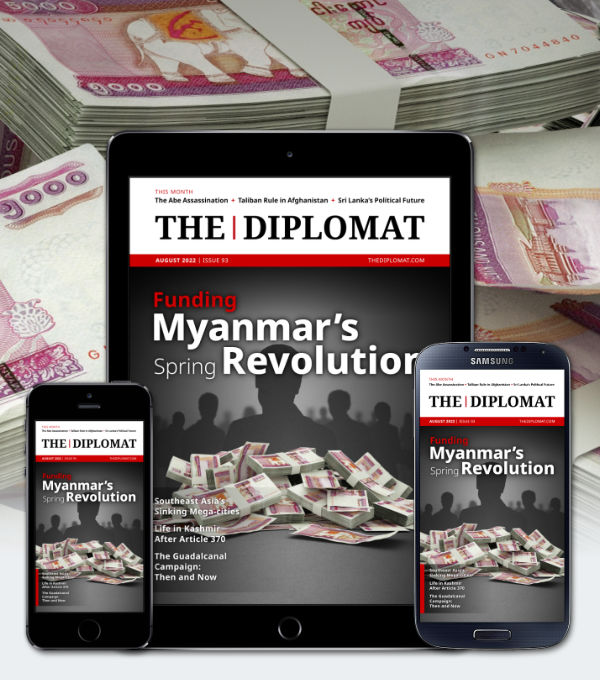| Welcome to the latest issue of Diplomat Brief. This week our top story examines the fate of higher education – for both women and men – under Taliban rule in Afghanistan. We also have an interview with James Curran, a professor of modern history at Sydney University, about the complex mixture of euphoria and fear that has marked Australia-China relations for the last 50 years. |
| Story of the week |  | Society Higher Education in Taliban-Ruled Afghanistan: Threatened But Not GoneWhat Happened: Since the Taliban retook control of Afghanistan just under a year ago, much of the international community’s attention has focused on restrictions on girls’ education in secondary schools. While a serious concern, external actors are overlooking the plight of older students, both male and female, who are trying to continue their university educations. Many faculty members have fled the country as part of a wider “brain drain” in Afghanistan, while students “have to contend with shifting Taliban restrictions on dress, freedom of speech, and, particularly for women, travel.” Our Focus: Abdul Aziz Mohibbi, who was the chancellor of Bamyan University until the Taliban takeover in 2021, writes for The Diplomat that the impact of the regime change was immediate. “The new government sent a ‘representative’ from the Ministry of Higher Education to oversee the university… The representative brought with him a militia of bodyguards and he hired former Taliban fighters across the college. Women were excluded from classes initially, and students and faculty were soon censoring themselves in and out of classes, fearing Taliban punishment.” Amid the worsening climate, Mohibbi fled the country – and he was not alone. Those faculty members who could leverage connections abroad to leave have done so. Meanwhile, the economic crisis in Afghanistan has forced more and more students to drop out of school. For those who remain, a university education will look far different now than it did a year ago: “Already the Taliban have increased the national requirement of classes focused on ‘Islamic Civilization’ from one or two, depending upon degree, to 24.” What Comes Next: “The long-term future of education in Afghanistan is dark. The Taliban have ordered that every district have a government madrassa. Faculty and students in fear of the authorities are increasingly self-censoring. Those in the classroom fear being reported by informants,” write Mohibbi and his co-author, Noah Coburn. Yet thousands of dedicated students and faculty members remain at Afghan universities, and even small efforts from the international community to support them would go a long way. From financial support to research cooperation, Afghanistan’s university scholars are in dire need of help from their international peers. Read this story |
| Behind the News | INTERVIEW James CurranJames Curran, a professor of modern history at Sydney University and the author of “Australia’s China Odyssey: From Euphoria to Fear,” on the immense symbolism of Australia-China relations: “I think it is important to remember the breakneck speed at which Australian policy towards China changed in the early 1970s…The relationship with Beijing came to be the symbol of a new era in Australia’s outlook on the world. China became invested with a sense of euphoria and liberation: that Australia could chart a new foreign policy that did not necessarily look instinctively to its great and powerful friends in London and Washington.” Read the interview |
| This Week in Asia | Northeast Asia China’s Military Drills Targeting Taiwan ContinueThe fallout from U.S. House Speaker Nancy Pelosi’s trip to Taiwan last week continues, as China has extended indefinitely military drills surrounding the island that were originally scheduled to conclude on Sunday. Already, Beijing has broken new ground with its military response, including repeated crossings of the median line in the Taiwan Strait and missile launches that crossed over Taiwan before splashing down in the ocean to the east – some in Japan’s EEZ. Worryingly, China has also cancelled several crisis management mechanisms with the U.S. military, even as the risks of escalation rise. Find out more | South Asia What Does a TTP Leader’s Death Mean for Pakistan’s Peace Talks?On Sunday, a roadside bomb killed a top leader of the Pakistani Taliban, or TTP, according to sources with both Pakistan’s military and the TTP itself. It’s unclear how the killing of Omar Khalid Khurasani will impact ongoing talks between Pakistan and the TTP. Meanwhile, the death of the TTP leader in Afghanistan may further fray ties between Islamabad and the Taliban, as the Taliban’s continued support for the deadly terrorist group has long been a sore point for Pakistan. Find out more | Southeast Asia ASEAN Puts Myanmar’s Military Junta on NoticeASEAN has given Myanmar’s coup government three months to begin implementing its Five-Point Consensus plan to resolve the country’s conflict. The joint communique issued after last week’s ASEAN Foreign Ministers’ Meeting stated that the grouping was “deeply disappointed by the limited progress” in implementing the plan, and said the junta’s adherence would be reviewed at the ASEAN Summit in November, in order “to guide the decision on the next steps.” Coming after the military government’s execution of four political prisoners, the communique, which was followed by a similar message from ASEAN special envoy Prak Sokhonn, is the latest indication that the Southeast Asian bloc is fast running out of patience with its problem member. Find out more | Central Asia Kyrgyzstan and Uzbekistan Further Border TalksBishkek and Tashkent have moved slowly but steadily over the past six years toward finally delimiting and demarcating the entirety of their 1,314-kilometer border. The latest round of talks started this week in Cholpon-Ata, a city on the coast of Kyrgyzstan’s idyllic Issyk-Kul, and officials are hopeful that they can complete work on settling the border this year. Find out more |
| Word of the Week | Society KelinUzbek for “daughter-in-law,” a role that can be disturbingly similar to domestic servitude in Uzbekistan’s traditional family model. Find out more |
| Webinar | The Diplomat Asks Indonesia's Plans for the G-20Indonesia’s G-20 presidency has faced major headwinds following Russia’s invasion of Ukraine in February 2022. Indonesia's hosting of the G-20 at this crucial time has plunged the Jokowi administration, not known for its foreign policy ambitions, into global politics. And President Joko “Jokowi” Widodo seems to be embracing the moment, embarking on trips to both Russia and Ukraine earlier this year and a rare post-pandemic visit to China in July. What does Indonesia’s handling of the Russia-Ukraine War, and its G-20 presidency more generally, tell us about Jokowi’s foreign policy approach? If you missed our live webinar last week, you can now view the recording. Watch the webinar here |
|  |




